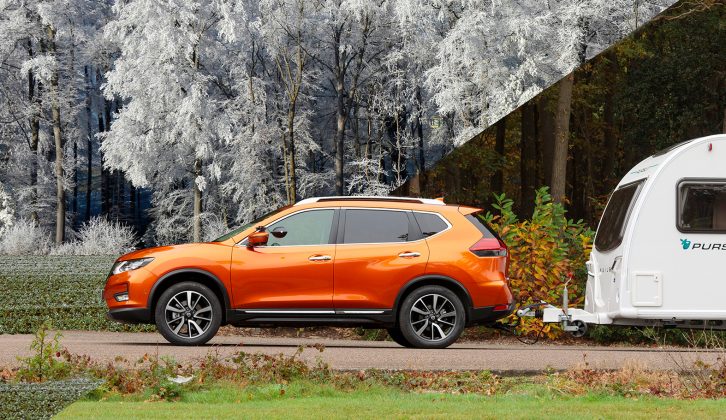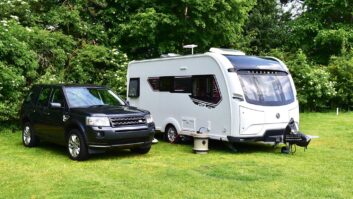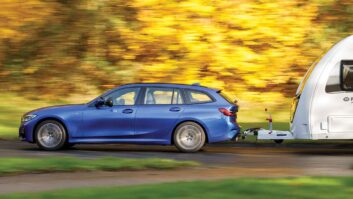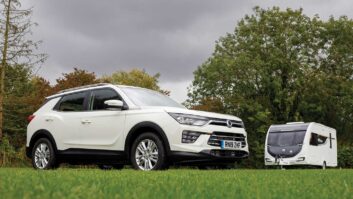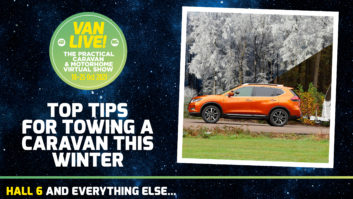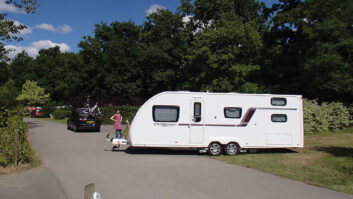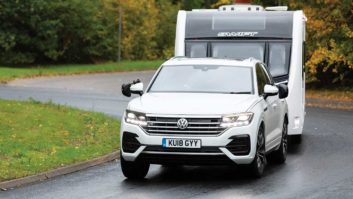Winter can be a great time of year for caravan holidays.
Crisp, clear mornings, pale blue skies, quiet campsites – if you put your caravan in storage for the winter you don’t know what you’re missing.
Like any kind of driving in the winter months, towing places extra demands on your tow car, caravan and your skills as a driver.
Towing in winter isn’t necessarily difficult, but it pays to be prepared. Here are our tips for stress-free winter towing.
Winter tyres?
The big question is whether or not to fit winter tyres.
The majority of drivers in the UK don’t, but there are sensible reasons to think very carefully about switching to winter rubber, especially if you plan to tour anywhere remote or hilly where winter weather is likely to bite hardest.
The idea that winter tyres are only useful in snow and ice is a misconception which has been corrected so many times there can hardly be anyone left who doesn’t know it is bunkum.
But at the risk of telling you what you already know, winter tyres should give superior grip once the temperature is 7˚C or below.
Extra groves in the tyres to lift water from the road surface make them more effective than summer tyres when it’s wet as well as cold.
In a mild winter, it’s tempting not to bother. If severe weather hits, though, winter tyres on your tow car will be invaluable.
All-season tyres?
The tyre industry understands the reluctance of car drivers to go through the hassle of switching to winter tyres and back to summer tyres in the spring. An alternative to both is an all-season tyre.
One of the best is the Michelin CrossClimate, although Michelin prefers to call it a ‘summer tyre which can be used in winter conditions’. It’s designed to operate effectively across a wider spectrum of temperatures than a pure summer or winter tyre.
The CrossClimate is certified for winter use, so you can legally use it on those foreign winter roads where winter tyres are compulsory.
It rather sounds too good to be true, but the CrossClimate has finished first in a comparison of all-season tyres by the German motoring organisation, the ADAC.
According to the ADAC, other tyres which offer good performance across a variety of temperatures and surface conditions include the Goodyear Vector 4Seasons Gen 2 and the Vredestein Quatrac 5.
If you’ve been in two minds about switching to winter tyres, a four-season tyre could be the solution. But if you know you’ll be heading somewhere snowy and icy a pure winter tyre will perform better still.
Could you put winter tyres on your caravan? It’s possible.
Caravan tyres are usually car or light commercial vehicle tyres, so you should be able to find winter tyres to fit. I’d be very interested to hear the experiences of readers who have gone to the trouble.
Changing the tyres on your tow car should be the priority, but winter tyres on a caravan ought to deliver better braking and more lateral grip in wet and cold weather.
Prepare your tow car
Having the right tyres for the conditions is a good start. Making sure they are inflated to the correct pressures for towing will mean they perform at their best.
As with any long journey, it makes sense to be sure your car is in A1 condition before you set off.
Check the oil level, and make sure the coolant is at the correct level, too. It’s unlikely to need topping up unless there’s a leak.
Be sure the screen wash reservoir is replenished as well, and that you use washer fluid suitable for the temperatures you are likely to encounter.
Pack a proper ice scraper to deal with a frozen windscreen – it’s a lot quicker and more effective than an old loyalty card.
Prepare for the worst
Even with a well prepared car running appropriate tyres, there’s no guarantee you won’t get stuck or breakdown. A grid-locked freezing cold motorway is no place to spend your leisure time, but it makes sense to be prepared.
That means taking food, water and warm clothing with you in the car. An emergency blanket for the driver and every passenger is another sensible precaution, in case the engine conks out and you have no heating. Hi-vis vests will make you easier to spot if you have to leave your car.
A compact snow shovel could be enough to dig you out of a tricky patch of snow, and a small portable power pack will recharge your phone if it’s running low.
A torch will be invaluable if you are stranded in the dark. And of course, it’s sensible to have a first aid kit with you at any time of year.
Prepare your caravan
We’re thinking mostly of the car and the journey here, but it also makes sense to be sure your caravan is ready for winter.
Checking the condition and pressure of the tyres is a must. If you are heading to a pitch without an electrical hook-up you’re likely to get through a lot of gas to keep warm, so make sure you have enough before you set off.
If it’s been a while since your caravan has had a professional service, consider having this done before putting your tourer through the demands of a winter caravan holiday.
Check the condition of the breakaway cable, towing gear, electrics, leisure battery, and the heating and ventilation system. Especially the heating!
Above all, enjoy it
If this makes winter caravanning seem daunting, it isn’t meant to.
Being well prepared doesn’t take much effort, really.
It’s worth it for the peace of mind you get when you set off knowing your car and caravan are both in perfect condition and ready for winter weather, leaving you to enjoy your holiday.
Towing in winter isn't necessarily difficult, but it pays to be prepared
